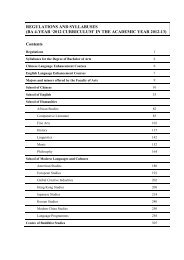Bachelor of Arts (BA) - The University of Hong Kong
Bachelor of Arts (BA) - The University of Hong Kong
Bachelor of Arts (BA) - The University of Hong Kong
You also want an ePaper? Increase the reach of your titles
YUMPU automatically turns print PDFs into web optimized ePapers that Google loves.
),)operates),308PSYC0019.Psychology <strong>of</strong> personality (6 credits)This course will critically examine and attempt a synthesis <strong>of</strong> a number <strong>of</strong> theories <strong>of</strong> personality asexemplified in the lives <strong>of</strong> some <strong>of</strong> the significant figures in the field. <strong>The</strong> relationship <strong>of</strong> specifictheories to practical applications, personality assessment and psychotherapeutic techniques may beincluded. <strong>The</strong> major aims <strong>of</strong> the course are to provide a survey <strong>of</strong> the breath and complexity <strong>of</strong> this fieldand to provide a perspective from which to examine assumptions about human nature and theevaluation <strong>of</strong> behaviour.Assessment: 50% coursework, 50% examination.PSYC0020.Fundamentals <strong>of</strong> social psychology (6 credits)<strong>The</strong> course gives an overview <strong>of</strong> the field which studies the behaviour <strong>of</strong> individuals in social contexts.It covers social perception, social cognition, social motivation, attitudes and attitude change, attitudeand behaviour, aggression, helping, moral behaviour, social influence on individual behaviour andgroup dynamics. <strong>The</strong> effects <strong>of</strong> Chinese culture on various social behaviours will form the part <strong>of</strong> thediscussion.Assessment: 70% coursework, 30% examination.PSYC0021.Psychology in China: heritage and contemporary research (6 credits)This course examines some traditional Chinese concepts and issues, as well as important contemporaryresearch in China. Topics include Qigong, psychopathology and psychotherapy from a traditionalChinese viewpoint, sports and health psychology, organizational behaviour etc.Prerequisite: PSYC1001 or (PSYC1002 & PSYC1003).PSYC0022.Biological psychology (6 credits)This course provides an introduction to biological aspects <strong>of</strong> behaviour. <strong>The</strong> topics include: biologicalbases <strong>of</strong> behaviour, development, learning, memory, and abnormal psychology; the nervous system;processes <strong>of</strong> brain maturation; genetic influences; psychophysiology.Prerequisite: PSYC1001 or PSYC1002.PSYC0023.Psychology <strong>of</strong> human communication (6 credits)This course is a laboratory course in applied social psychology. It examines the cognitive andinterpersonal bases <strong>of</strong> human communication. Topics include: the cognitive and interpersonalprocesses involved in message formulation and comprehension; the communicative functions <strong>of</strong>nonverbal behaviour such as filled pauses and hand gestures; the cognitive and social consequences <strong>of</strong>language use; and social cognitive models <strong>of</strong> persuasive communication.Assessment: 70% coursework, 30% examination.Prerequisite: PSYC1001 or (PSYC1002 & PSYC1003).PSYC0024.Interpersonal relationships in Chinese societies (6 credits)This course explores, from an indigenous perspective, the social interactional processes and the notion <strong>of</strong>interpersonal relationships in Chinese societies. Specifically, it examines how the indigenous concept <strong>of</strong>in everyday social interactions and how it relates to other concepts, such asrenqing(meinzitrust, and loyalty. Through practical exercises, experience sharing, strategicplanning and discussions <strong>of</strong> relevant local examples, the students will learn the skills to deal with peoplein real-life work environments.Assessment: 70% coursework, 30% examination.Prerequisite : PSYC1001 or (PSYC1002 & PSYC1003).人( 面 子 係情guanxi( 關
















